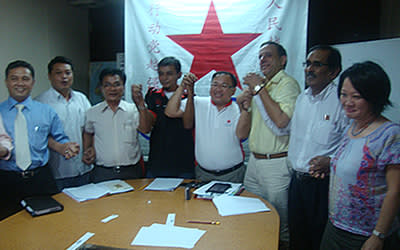S’poreans decide political system, not the PAP: SDP

Leaders of Singapore's opposition parties rebutted the political arguments made by Prime Minister Lee Hsien Loong at the National University of Singapore's (NUS) Kent Ridge Ministerial Forum held on Tuesday.
"Singaporeans will decide the political system, not the PAP," the Singapore Democratic Party said in a statement last night. "There's no need for the PAP to do anything with itself but to ensure a free and fair election system and a free and pluralistic media."
SDP was referring to PM Lee's revelation that the ruling People's Action Party (PAP) had "seriously considered" splitting into two but eventually decided against it.
Several opposition leaders said that it is more important to build a healthier political system and work towards a different future model of governance rather than be solely dependent on a one-party system.
At the forum, PM Lee reportedly said that he is putting together the "next A-Team for Singapore", whose best chance of delivering results hinged on how much support they get at the coming General Election (GE).
He also said that now was not the time to buy insurance — referring to the opposition — but rather it was more important to ensure that the fourth generation of leaders succeed.
Best time for 'insurance'?
In response to PM Lee's statements, secretary-general of the Workers' Party (WP) Low Thia Khiang was quoted by Today as saying, "I think buying insurance is the right thing to do. If PM thinks we shouldn't buy insurance, then why do we buy MediShield? Should we wait till we fall sick before we buy it?"
"Now is the best time to buy insurance. Conditions are now good for us — economic growth is not bad, government is stable — to build up a healthier political system... I think everyone knows how to prepare for a rainy day. I think (his) is a logic that doesn't make sense."
Echoing his sentiments, WP's chairman, Sylvia Lim added that political competition will "empower citizens to have bargaining power against the ruling party".
At the forum, PM Lee also argued that a two-party system is not "not workable" in Singapore because there is simply "not enough top talent". He also said that such a system would result in weaker governance.
Countering this point, Ms Lim pointed out that New Zealand, with a population of about 4 million — similar to that of Singapore — has two major political parties able to govern.
In addition, leaders of the Singapore Democratic Alliance (SDA) Desmond Lim and Reform Party (RP) chief Kenneth Jeyaretnam warned against depending on one party and the direction it sets for so long.
"Who says the best leaders come from the People's Action Party? The Soviets had that (a one-party rule), and look where it got them," said Jeyaretnam.
Secretary-general of the National Solidarity Party Goh Meng Seng said that he believes that talented people simply choose not to join the ruling party and some are "fearful" of joining the opposition.
WP's Low said, "I think our PM shouldn't be so pessimistic about our future. Compared to 20 years ago, Singapore has more talent than before and educational standards are higher… and I remember we've said before we're a city of possibilities for the future governance model."
The SDP called on the PAP to stop "belittling and patronising" the public.
Other issues
The opposition leaders also touched on other issues raised at the NUS Forum. Responding to a question by an undergraduate, PM Lee had said that the PAP was justified to link upgrading programmes to votes.
Commenting on this, Jeyaretnam said that he was "disappointed" by the response.
"I thought we had passed that stage, that Singapore had evolved and become more democratic than that. I only hope the electorate will see through it and won't be influenced," he said.
Meanwhile, Ms Lim also took the chance to take a jab at the group representation constituencies (GRC). She said that the GRC, which was meant to ensure ethnic representation in politics, has morphed into a "successful way to induct people for the PAP".
"I think we've lost something precious by lowering the political barrier for new PAP candidates to get elected if they ride on the heavyweights' coat-tails," she said.

